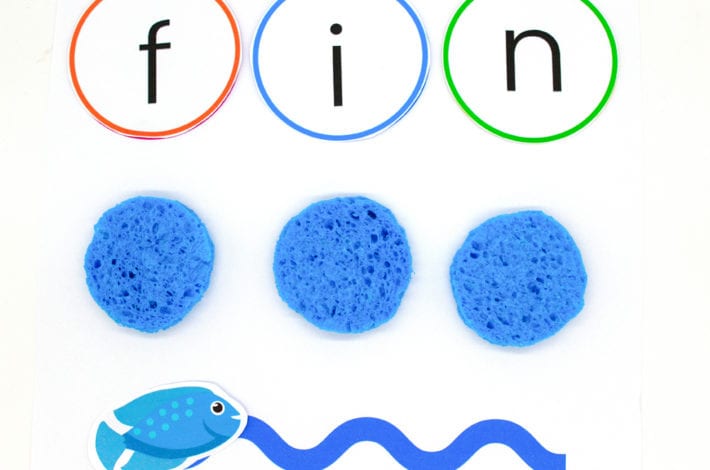Making the leap from making letter sounds, to combining those sounds in order to read words is not always easy for kids to grasp at first.
This activity takes them through the steps that they need to take to turn letter sounds into word sounds. By the end of it they will hopefully have read their very first word.
It’s split into 3 parts:
- Sound out your letters one at a time.
- Sound out your letters faster.
- Blend the sounds into the word.
It’s all done using a fish game so that the kids can interact with the word they’re using.
They squish the circles for the letter sounds and zoom their fish across the ocean when they blend the word. Because reading is more fun with squishing and zooming.
Summary
Time: 10 minutes
Ages: Little kids to Big kids
Difficulty to Set Up: Easy peasy
Skill: Learn to blend

You will need:
- Our free printable letters and mat (see above) or 2 blank sheets of card or paper to create your own
- Kitchen sponge or 3 milk bottle caps
- Pen
- Scissors

Step 1: Prepare the letters
If you’ve been emailed our print-outs then you can print these and cut out the different elements:
- the fish
- the letter circles
Set them to one side next to the main mat.
If you’re making these yourself then draw circles and add a letter in each one. Then mark out circles on another sheet of paper for your game mat.
The letters we’ve chosen can make up simple 3 letter words. You can mix and match to create your own words.
When you’re starting out it helps to begin with words that rhyme like:
set, met, bet or fin, win, bin.

Step 2: Cut out circles from a kitchen cloth
Draw around a milk carton lid on a blue sponge. Then cut out three circles.
These 3 circles sit underneath each letter. Your child squishes each one as they sound out the letter to mark it as done.
They also look a bit like ‘bubbles’ too.
If you prefer you can also use other items rather than kitchen cloth like:
- playdough balls that they squash with their thumb.
- milk bottle caps that they can press down on.
- giant marshmallows.

Step 3: Set up your first word
This is how you set up the game:
- Choose your first word for your child to sound out. It helps if they’re already familiar with the sounds of the letters in that word. Here we have chosen the word ‘fin’.
- Place the letters on the circles at the top of the game.
- Place your sponge circles (or ‘bubbles’) on the circles underneath.
- Place your fish on the first coral, at the start of the line.
Play the game and learn to blend
Start at the top of the game mat and work your way down.

Sound out each letter on its own
Go slowly to each letter one at a time. Ask your child what the sound of the letter is. If they don’t know help them out a few times until they become familiar with the letter sounds.
Squish the sponge circles
To mark each letter sound as ‘done’, ask your child to squish the sponge circles as they make the sound.
So, in this case they must squish a bubble each time they say the sounds ‘ffff’, ‘ih’ and ‘nnnn’.
Do it faster
Sound out the letter sounds a few times, going faster and faster each time. See how quickly they can press the sponge bubbles saying the letter sounds that the sponge circle corresponds to.

Blend the word
Blend the sounds together to make the word. You will probably need to help them out the first few times as it will be a completely new concept for them.
Show them that ‘ffff – iiii – nnnn’ – is fin.
As they blend the letters together they can move the fish across the line from one coral to the next.
This shows them how the word (like the fish) is a constant movement. Unlike the sponges which were one off sounds.
You can keep playing with more rhyming words (pin, din, bin) and with different sets of words (big, wig, pig).
If this has all gone well then congratulations, your child has read their first word!
If they haven’t grasped it yet then don’t worry. Blending the sounds is a new concept which takes some time and repetition for kids to get used to.
Keep showing them the same simple 3 letter words. Sound them out together and then blend the sounds together to make the word for them.
Once they’ve seen how it works a few times with the same words they can gradually start to understand how it works. One day they might surprise you by reading the word before you even ask them to.


